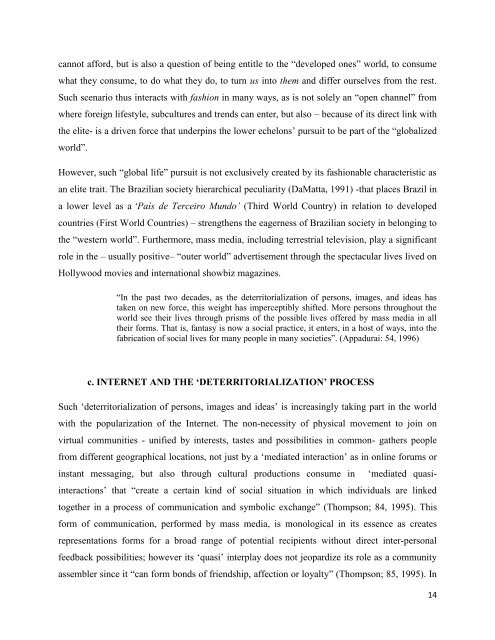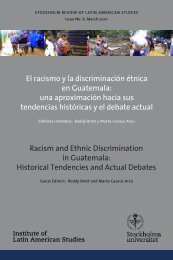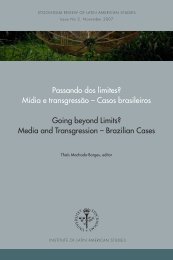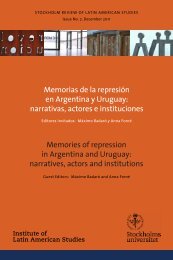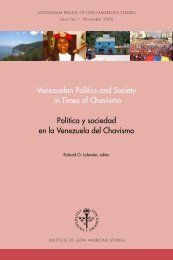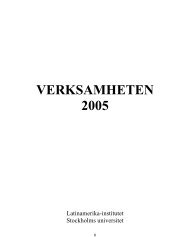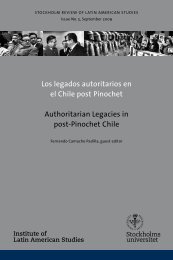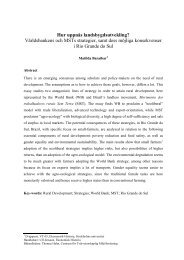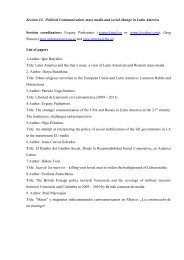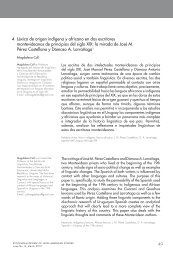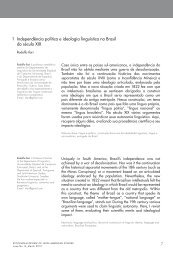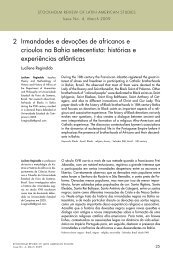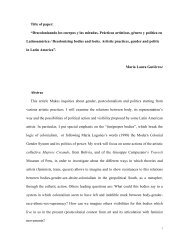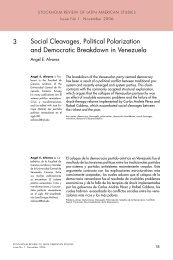But how Brazilians consume brand new foreign audio-visual productions? For this question,most <strong>of</strong> the time, the answer is paying. For those who can afford it, there are diverse means to getin touch with world elite‟s music, movies and series such as cable television, internet, cinema,etc. Each one <strong>of</strong> them requires different preconditions and, in doing so, releases its status valueover its users. Internet requires from its user a previous knowledge about the content that (s)he isaiming to get, a fast connection and works better if its user has some familiarity with computersand English language. Movies on cinema, and in movie rentals, tough they can be chosen atrandom, also require a certain prior acquaintance about its content from the viewer because <strong>of</strong> itsmodus operandi. Both internet and cinema – for their common characteristic- thus <strong>of</strong>fer differentstatus layers for their users at one‟s eye; the more exclusive is the content to be consumed, thebetter.Paid television, though, provides its subscribers with both local channels that transmit North-<strong>American</strong> series, cartoons, shows, etc and foreign channels that are broadcasted in real time,when comes to news, or with a little delay to subtitle insertion – in most <strong>of</strong> other cases. Eitherway, paid television content in Brazil is mostly foreigner and broadcasts in English withPortuguese subtitles (when a paid TV channel does not transmit in English or Portuguese, thechannels are paid within the “Ethnic” package 15 ).Moreover, the link between Brazilian paid television and north-<strong>American</strong> culture is so evidentthat almost everything within the former has an English name - from Paid television companiesto its channels and shows, even when they are local productions. What is more, even nowadayspaid TV design is an outspread, or a simplification, <strong>of</strong> the north-<strong>American</strong> commercial televisionscheme (Williams, 1990), where audiences are attracted to pay directly to the producers for theirfavourite entertainment ways – bypassing an external advertiser necessity. Furthermore, onewould argue that such entertainment system is moved by the consumerist ideal that one can haveeverything, that money can pay for, in excess (Baudrillard, 1998), in which the US, throughout19 th and 20 th century, became its major icon (Stearns: 66-71, 2001).Therefore North-<strong>American</strong> culture is seen as a synonym <strong>of</strong> exclusiveness and wealth also withinmedia usage. Is not just a matter to be able to pay for something that most <strong>of</strong> the population15 http://netcombo.globo.com13
cannot afford, but is also a question <strong>of</strong> being entitle to the “developed ones” world, to consumewhat they consume, to do what they do, to turn us into them and differ ourselves from the rest.Such scenario thus interacts with fashion in many ways, as is not solely an “open channel” fromwhere foreign lifestyle, subcultures and trends can enter, but also – because <strong>of</strong> its direct link withthe elite- is a driven force that underpins the lower echelons‟ pursuit to be part <strong>of</strong> the “globalizedworld”.However, such “global life” pursuit is not exclusively created by its fashionable characteristic asan elite trait. The Brazilian society hierarchical peculiarity (DaMatta, 1991) -that places Brazil ina lower level as a ‘País de Terceiro Mundo’ (Third World Country) in relation to developedcountries (First World Countries) – strengthens the eagerness <strong>of</strong> Brazilian society in belonging tothe “western world”. Furthermore, mass media, including terrestrial television, play a significantrole in the – usually positive– “outer world” advertisement through the spectacular lives lived onHollywood movies and international showbiz magazines.“In the past two decades, as the deterritorialization <strong>of</strong> persons, images, and ideas hastaken on new force, this weight has imperceptibly shifted. More persons throughout theworld see their lives through prisms <strong>of</strong> the possible lives <strong>of</strong>fered by mass media in alltheir forms. That is, fantasy is now a social practice, it enters, in a host <strong>of</strong> ways, into thefabrication <strong>of</strong> social lives for many people in many societies”. (Appadurai: 54, 1996)c. INTERNET AND THE ‘DETERRITORIALIZATION’ PROCESSSuch „deterritorialization <strong>of</strong> persons, images and ideas‟ is increasingly taking part in the worldwith the popularization <strong>of</strong> the Internet. The non-necessity <strong>of</strong> physical movement to join onvirtual communities - unified by interests, tastes and possibilities in common- gathers peoplefrom different geographical locations, not just by a „mediated interaction‟ as in online forums orinstant messaging, but also through cultural productions consume in „mediated quasiinteractions‟that “create a certain kind <strong>of</strong> social situation in which individuals are linkedtogether in a process <strong>of</strong> communication and symbolic exchange” (Thompson; 84, 1995). Thisform <strong>of</strong> communication, performed by mass media, is monological in its essence as createsrepresentations forms for a broad range <strong>of</strong> potential recipients without direct inter-personalfeedback possibilities; however its „quasi‟ interplay does not jeopardize its role as a communityassembler since it “can form bonds <strong>of</strong> friendship, affection or loyalty” (Thompson; 85, 1995). In14
- Page 2 and 3:
AbstractThis article explores some
- Page 4 and 5:
displaced people in relation to the
- Page 6:
Colombian case as a particular cond
- Page 9 and 10:
displacement instead of rejecting d
- Page 11 and 12:
5. Inter American Court contributio
- Page 13 and 14:
Moreover, the displaced are subject
- Page 15 and 16:
fabric on which lies the basis of t
- Page 17 and 18:
assistance; the right to exercise b
- Page 19 and 20:
ordinating and improving assistance
- Page 21 and 22:
and brutalisation of the armed conf
- Page 23 and 24:
subjects a free legal consultation
- Page 25 and 26:
8. Conclusions: how can the protect
- Page 27 and 28:
ReferencesACNUR, Balance de la pol
- Page 29 and 30:
FAMIG (Fundación de atención al m
- Page 31 and 32:
Una comunidad de Pazfrente al Estad
- Page 33 and 34:
salud y la educación. La pérdida
- Page 35 and 36:
gobierno es: “ser propositivo y d
- Page 37 and 38:
esidente y a los refugiados que van
- Page 39 and 40:
paramilitares, las comunidades camp
- Page 41 and 42:
asesinado. 28 Esta afirmación fue
- Page 43 and 44:
Los habitantes desplazados solicita
- Page 45 and 46:
La segunda detención de Elkin Dari
- Page 47 and 48:
Comunidad decidió declarar en la C
- Page 49 and 50:
Comunidad de San José de Apartadó
- Page 51 and 52:
Brigada XVII del Ejército. 62 Al d
- Page 53 and 54:
la impunidad en que se mantienen, y
- Page 55 and 56: como la mafia o el narcotráfico, s
- Page 57 and 58: Ratifican su existencia como una Co
- Page 59 and 60: La autonomía de las comunidades ch
- Page 61 and 62: A violência no romance O matador d
- Page 63 and 64: “The characters are emptied of co
- Page 65 and 66: pelos leitores, confrontando o leit
- Page 67 and 68: No caso da segunda vítima, o que p
- Page 69 and 70: meios para um tratamento odontológ
- Page 71 and 72: acompanhado seu trabalho” (Melo 1
- Page 73 and 74: LINS, Paulo (1997): Cidade de Deus:
- Page 75 and 76: transformação social. O Direito d
- Page 77 and 78: Constituição deveria ser a expres
- Page 79 and 80: O problema central desta discussão
- Page 81 and 82: Transitórias. A revisão é mais a
- Page 83 and 84: ultrapassada, que reduz o Direito
- Page 85 and 86: construção do discurso do estado
- Page 87 and 88: socialismo; o povo de El Salvador e
- Page 89 and 90: inquisição. Ser espanhol era ser
- Page 91 and 92: existência de um suposto “pacto
- Page 93 and 94: da família.Outro aspecto important
- Page 95 and 96: AbstractIn the past two decades, gl
- Page 97 and 98: 1. Introduction„Globalization Soc
- Page 99 and 100: a. THE IMPORTANCE IN BEING PART OF
- Page 101 and 102: 1990). However certain authors argu
- Page 103 and 104: author Jô Soares, that aims to upp
- Page 105: at home (…) and playing popular s
- Page 109 and 110: Proportion of individuals that have
- Page 111 and 112: the distinction between the deterri
- Page 113 and 114: Routledge.Online References-2004 Un
- Page 115 and 116: IntroducciónEl presente trabajo se
- Page 117 and 118: datos históricos acerca del valor
- Page 119 and 120: producciones de La Gaceta, así com
- Page 121 and 122: En lo que refiere a los discursos p
- Page 123 and 124: marchar por algo, y si esta identid
- Page 125 and 126: de representaciones del pasado con
- Page 127 and 128: ApéndiceNota de La Gaceta, secció
- Page 129 and 130: Atte.-„Que se vayan los que no si
- Page 131 and 132: Ciudades blancas. Crónicas rojasLa
- Page 133 and 134: econocimiento de su condición de c
- Page 135 and 136: itmo de cumbia en esa zona que de l
- Page 137 and 138: Los pibes chorros todavía mantiene
- Page 139 and 140: El texto entra dentro de la línea
- Page 141 and 142: El 11 de febrero de 1999, Magdalena
- Page 143 and 144: Speranza, Graciela, “Cómo vivir
- Page 145 and 146: Sin la complejidad teórica de Ratz
- Page 147 and 148: pone el énfasis en la organizació
- Page 149 and 150: el siglo XX, no logra conformar un
- Page 151 and 152: primera) biografía sobre Raúl Pre
- Page 153 and 154: Una rápida consulta a los periódi
- Page 155 and 156: valiosos de la vida colectiva. Se t
- Page 157 and 158:
identificado como un caso de narrad
- Page 159 and 160:
La joven se refiere al arma que la
- Page 161 and 162:
Todas las veces en las que pudo mor
- Page 163 and 164:
atravesando una quinta a oscuras, c
- Page 165 and 166:
Notas:1 El proyecto consta de dos p
- Page 167 and 168:
Consumption society challenged: Bra
- Page 169 and 170:
due to unequal land distribution we
- Page 171 and 172:
Hence, the neo-liberal free trade a
- Page 173 and 174:
een to stand up to neo-liberalism a
- Page 175 and 176:
structural adjustment programs and
- Page 177 and 178:
a participant in the larger counter
- Page 179 and 180:
Löwy, Michael 2001. “The socio-r
- Page 181:
World Bank 2002. “What is empower


